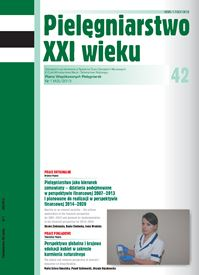The role of psychoeducation in the treatment of schizophrenia
Keywords:
psychoeducation, schizophreniaAbstract
PSYCHOEDUCATION IN THE TREATMENT OF SCHIZOPHRENIA
Schizophrenia is a chronic disease, with periods of acute illness and of remission. It is characterized by diversified course and clinical presentation, symptoms of mental disintegration and the risk of maladjustment. Even in case of applying optimal medicine and optimal doses, pharmacotherapy is not the sufficient protection against a relapse. The therapy of sick people should include varied influences, such as biological methods, sociotherapy, psychotherapy and rehabilitation. Psychoeducation of both patients and their families is also a very important element in the therapy of schizophrenia. Good contact with the family has an impact on the effective process of treatment. Participation of patients and their families in psychoeducation affects reducing the frequency of the hospitalization and extending periods of remission. It contributes to the improvement of cooperation with the treated patient, increases the adherence to medical recommendations and improves the quality of patient’s life. The concept of psychoeducation is to transmit the knowledge of the disease, treatment and recognition of symptoms and relapses of the disease, and also to develop the plan of therapy in such situations. The sense of psychoeducational programs is unquestionable, therefore, the aim is to present the assumptions and the analysis of the impact of psychoeduacation on the process of patient’s treatment.
References
1. Bilikiewicz A. Psychiatria. Wrocław: Urban& Partner; 2002.
2. Różyczka W, Czernek A, Wojtas K. Wybrane modele psychoedukacji rodziny i pacjentów chorych na schizofrenię. Zdr. Publ. 2008;118 (2): 226-231.
3. Juchnowicz D, Zdanowicz E, Mantur M. Rola psychoedukacji w leczeniu schizofrenii. Bad. Schizofr. 2007;8: 62-74.
4. Popławska R, Konarzewska B, Agnieszka T i wsp. Psychoedukacja rodzin w terapii schizofrenii. Ann UMCS. 2005;Vol. 60; Supp. 16; 423: 388-390.
5. Voltz H, Pajonk F. Schizofrenia. Wrocław: Urban@ Partner; 2004.
6. Barbaro B. Schizofrenia w rodzinie. Kraków: Wydawnictwo Uniwersytetu Jagiellońskiego. 1999.
7. Mączka G, Grabski B, Gierowski J i wsp. Psychoedukacja grupowa w kompleksowym leczeniu choroby afektywnej dwubiegunowej - doświadczenia krakowskie. Psychiatr. Pol. 2010; 44(1): 89-100.
8. Meder J. Schizofrenia - leczenie i rehabilitacja. Przew Lek. 2004; 5: 52-59.
9. Ugniewska C. Pielęgniarstwo Psychiatryczne i neurologiczne. Warszawa PZWL; 1998.
10. Górna K, Palacz M. Znaczenie psychoedukacji w opinii rodzin chorych na schizofrenię. Pielęgn. Pol. 2003; 2(16): 164-167.
11. Mc Farlame WR. Family Therapy In schizofrenia. New York, London: The Guilford Press 1983.
12. Górna J, Jaracz K, Suwalska A i wsp. Psychoedukacja w schizofrenii, a relacja terapeutyczna. Bad. Schizofr.2009;10: 96-100.
13. Cechnicki A. Rehabilitacja psychiatryczna- cele i metody. Psychiatr. Prakt. Klin. 2009; 2 (1): 41- 54
14. Meder J. Psychoedukacja pacjentów z zaburzeniami psychotycznymi. Wiad. Psychiatr. 2001;4: 52-56.
15. Juchnowicz D, Zdanowicz E, Mantur M. Wpływ psychoedukacji na postawę wobec leczenia farmakologicznego pacjentów z rozpoznaniem schizofrenii paranoidalnej. Bad. Schizofr. 2007;8: 75-87.
16. Meder J. Aktywny udział pacjentów w leczeniu farmakologicznym. Warszawa: Fundacja IPN; 1995.
17. Górna K, Suwalska A. Psychoedukacja chorych na schizofrenię. Pielęgn. Pol. 2001; 2: 238-245.
18. Barbaro B, Ostoja- Zawadzka K. Możesz pomóc. Poradnik dla rodzin pacjentów chorych na schizofrenię i zespoły schizofrenopodobne. Warszawa: PZWL; 1992.
19. Muraszkiewicz L. Rodzina partnerem efektywnego leczenia schizofrenii. Przew. Lek. 2002;5 (7): 27-33.
20. Haley C, O’ Callaghan E, Hill S. et al. Telepsychiatry and carer education for schizofrenia. Eur. Psychiatry. 2011; 26(5): 302-304.
21. Jewell TC, Downing D, Mc Farlame WR. Partnering with families: multiple family group psychoeducation for schizofrenia. J. Clin. Psychol. 2009;65 (8): 868-878.
22. Nasr T, Kausar R. Psychoeducation and the family burden in schizofrenia: a randomised controlled trial. Ann. Gen. Psychiatry. 2009;8: 17-24.
23. McFarlame WR, Lukens E, Link B. et al. Multiple- Family groups and psychoeducation In The treathment of schizofrenia. Arch. Gen. Psychiatr. 1995;52: 679-687.
24. Waluk A, Galińska B, Czernikowicz A. Schizofrenia w rodzinie- podsumowanie rocznej współpracy z rodzinami. Bad. Schizofr. 2006;7: 285-294.
25. Pitschel- Waltz G, Frobose T, Gsottschneider T. et al. Do individuals with schizofrenia and borderline intellectual disability benefit from psychoeducational groups? J. Intellect Disabl. 2009; 13 (4): 305-320.
26. Popławska R, Szulc A, Tomczak A. i wsp. Wpływ psychoedukacji na przebieg schizofrenii- wstępne wyniki 2- letniej obserwacji. Bad. Schizofr. 2005; VI; 6: 272-279.
27. Kissling W, Bauml J, Pitschel- Waltz G. Psychoedukation Und Complliance bei der Schizophrenie behandlung, Munch. Med. Wschr. 1995;137: 801-805.
28. Chądzyńska M, Meder J, Charzyńska K. Uczestnictwo w psychoedukacji osób chorych na schizofrenię- analiza zajęć z perspektywy pacjentów. Psychiatr. Pol. 2009; 43 (6): 693-704.
29. Wilczewska L, Ciszkowska – Kreft M. Udział pielęgniarki w rehabilitacji psychiatrycznej. Probl. Piel. 2011;18 (4): 483-489.
Downloads
Published
Issue
Section
License
Copyright (c) 2013 Emilia Paszkiewicz-Mes (Autor)

This work is licensed under a Creative Commons Attribution 4.0 International License.




